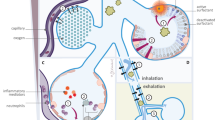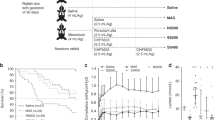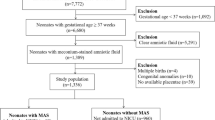Abstract
OBJECTIVE: To examine the hemodynamic effects of magnesium sulfate (MgSO4) in a neonatal model of meconium aspiration syndrome. DESIGN: A prospective animal study. PATIENTS AND PARTICIPANTS:Eight anesthetized neonatal piglets. METHODS: Animals were instrumented under fentanyl anesthesia for the determination of pulmonary and systemic blood pressures and cardiac index. A model of meconium aspiration was produced by instilling 6 to 7 ml of 20% fresh human meconium in normal saline down the endotracheal tube, resulting in hypoxemia (mean arterial O2 saturation 73 SD, 10%), respiratory acidosis (mean pH 7.08, SD 0.04; PACO2 89, SD 2 torr), and pulmonary arterial hypertension (mean pulmonary artery pressure 52 SD, 5 mm Hg). A total of four aliquots of MgSO4 (25 mg/kg equivalent to 0.1 mM/kg of magnesium) were administered intravenously to five animals (total of 100 mg/kg MgSO4). Three animals served as controls and did not receive MgSO4. RESULTS: Each dose of MgSO4 was associated with a transient decrease in heart rate, cardiac index, pulmonary and systemic arterial pressures, and SAO2, followed by a partial gradual recovery of all these variables within 2 to 3 minutes. According to measurements taken after MgSO4 therapy, there was a significant decrease in arterial saturations (from 73 SD (10%) to 63 SD (13%); p < 0.05), mean systemic blood pressure (from 77 SD (16 mm Hg) to 74 SD (15 mm Hg); p < 0.05) and pulmonary artery pressure (to 52 SD (5 mm Hg); p < 0.05). The ratio between pulmonary and systemic vascular resistance was not significantly affected by MgSO4 therapy. There were no changes in the control animals. CONCLUSION: The administration of magnesium sulfate is associated with increased hypoxemia in this model of meconium aspiration syndrome, probably because of worsening ventilation perfusion mismatch. These data do not provide any physiological support for the use of MgSO4 in the neonate with meconium aspiration and pulmonary hypertension and suggest that this agent should be used cautiously, if at all, in such situations.
This is a preview of subscription content, access via your institution
Access options
Subscribe to this journal
Receive 12 print issues and online access
$259.00 per year
only $21.58 per issue
Buy this article
- Purchase on Springer Link
- Instant access to full article PDF
Prices may be subject to local taxes which are calculated during checkout
Similar content being viewed by others
Author information
Authors and Affiliations
Corresponding author
Additional information
This study was supported by a grant from the University of Alberta Central Research Fund.
Rights and permissions
About this article
Cite this article
Barrington, K., Ryan, C. & Finer, N. Effects of Magnesium Sulfate in a Newborn Piglet Meconium Aspiration Model. J Perinatol 20, 373–378 (2000). https://doi.org/10.1038/sj.jp.7200403
Published:
Issue Date:
DOI: https://doi.org/10.1038/sj.jp.7200403
This article is cited by
-
Effects of probiotics on experimental necrotizing enterocolitis: a systematic review and meta-analysis
Pediatric Research (2017)



